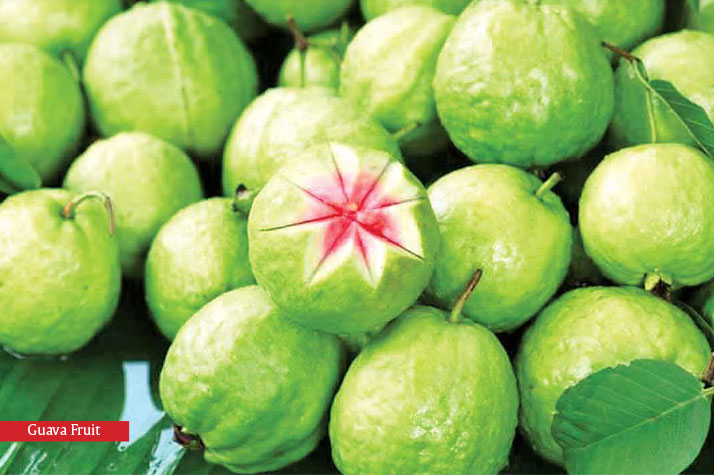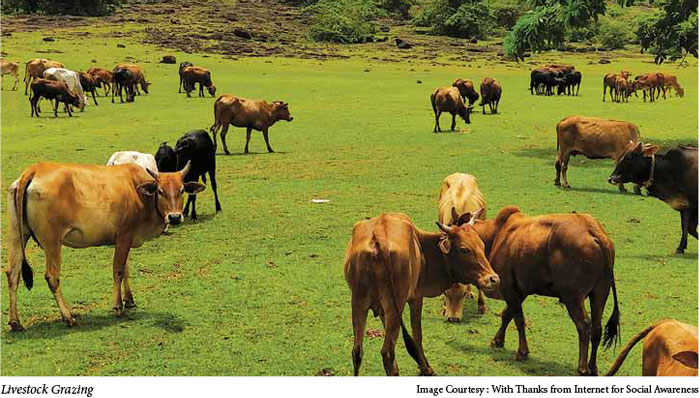
Guava/Amrood/Psidium guajava
By R K Nigam
Guava is an important fruit crop of the tropical, subtropical region specially in Central and South India, which are eaten as a fresh or made into beverage, jams and other ways. There are near about around 140 species of Guava that can be found in world. Guava grow in the form of evergreen shrub or small tree, of which cultivated varieties usually reached maximum 18 to 20 feet in height. Ripe guava fruit flesh can be white, light yellow, cream, pink or red colored. Guava contains numerous Phyto – chemicals which are too much useful for our body. Guava is also called a super fruit because of its nutritive value.
Properties of Guava : –
- Guava Ayurvedic properties are Rasa/taste – kashaya, madhur; Guna/ quality- tikshna and heavy; Potency-sheet /cold; Vipaka/ metabolism – madhur. In Ayurveda, it is considered as Tridoshna shak or it balance all the three doshas (Vata, pitta and kapha).
- Guava have some important properties for us whichare, Antioxidant, Hepato-protective, Anti-allergy, Anti-microbial, Anti-spasmodic, Cardio-protective, Anti-diabetic, and Anti-inflammatory activities. Guava can boost immune system and fight oxidative stress; hence, it reduces the risk of disease. The natural Antioxidant of this fruit help defend the body against proliferation of free radicals.
- Guava fruit is powerhouse of nutrients, which are good source of Energy, Dietary Fiber, Vitamin C, A, E, B, and several Minerals such as Potassium, Magnesium, Calcium, Sodium, Phosphorus, Zinc other Minerals.
- Vitamin C is rich in Guava fruit, which is crucial for maintaining the health of the inner lining of the blood vessels. This allows blood to flow easily and helps to reduce the risk of heart diseases.
- Guava have a lot of medicinal properties, generally which are used in cure of a lot of sickness like diarrhea, reducing fever, gastroenteritis, hypertension and others.
- Guava fruit are better diabetic friendly because, since they have a low Glycemic index (GI), which means that it is easily digested and absorbed slowly. The Glycemic index includes the development of how quickly cellulose is absorbed and discharged as glucose into bloodstream. The rise in glucose cause an increase in blood sugar level.
- Daily consumption of Guava is beneficial for individuals with diabetes mellitus because it helps in blood glucose control, improves insulin sensitivity and reduce insulin resistance. Guava is rich in Magnesium; it favors the entry of glucose in the muscles and cells and reduce blood glucose levels. Glycemic load of Guava is very low.
- Guava is a rich source of Dietary Fiber, which helps improves blood lipid profile and reduce blood sugar level. When Guava is eaten, the dietary fiber present in it enter the body, bind to bile acid and excretes it out of the body. For digestion of fat body requires bile acid, which come through Cholesterol (which are present in the body) because cholesterol is being used for the synthesis of bile acid, its decline in concentration in the blood, decreases overall blood Cholesterol level.
- In some research paper, skin of Guava fruit, increases blood sugar levels immediately, due to presence of high on simple sugar like glucose. So that the best way to consume a Guava fruit for diabetic people is to peel off its skin. Guava fruit without peel is more effective in lowering blood sugar as well as serum total Cholesterol, Triglycerides, LDL and it increases HDL(good Cholesterol) level also.
- The higher levels of Potassium and soluble Fiber in Guava are also thought to contribute to improve heart health and reduces the negative effects of Sodium on blood pressure. Potassium of Guava may be helpful in the widening of the arteries and ensures smooth blood flow throughout the body. Magnesium of Guava is known to relax the body nerves and muscles and may ease in stress.
- According to Ayurvedic point of view, High cholesterol is due to an imbalance of pachakagni/digestive fire and Ama (toxic remain in the body). Guava have properties to correct digestive fire and reduce Ama because it improves metabolism, thus it helps to control high Cholesterol level.
- Guava contains several Antioxidant; these compounds can protect skin from UV damage and potentially delay the signs of aging. The vitamin A and C in Guava play a role in enhancing skin firmness.
- Pink Guava contain Carotenoids, which are that give them their characteristic color. White guava does not contain these Carotenoids. Lycopene: a naturally occurring red Carotenoid pigment in red or pink guava, which is associated with a decrease risk of chronic disease as cardiovascular and cancer. Carotenoid are beneficial Antioxidant that can protect from disease and enhance immune system.
- Guava is one of the richest sources of dietary fiber, just one Guava fulfills about 12 % of our daily recommended intake of fiber, which makes it extremely beneficial for our digestive health. Constipation is caused when food is stuck in our colon. Guava is rich in Fiber which helps in clearing the blocked pathway and thus curing our constipation.
- Guava has highest quantity of vitamin C and Iron and both prevents us against cold and viral infection. Guava helps to reduce cough due to its kapha balance property. Cough is generally caused by accumulation of mucus in the respiratory tract. Guava helps to reduce accumulated mucus because of its kapha reducing property.
- In some articles, Guava leaf tea inhibit absorption of certain type of sugar, so that the sugar levels do not spike after meals. In Guava leaves, some micronutrient polyphenol present in leaves help to regulate the absorption of dietary carbohydrate within intestine. This help suppress a rapid increasing in blood sugar after meals. Guava leaf tea is a very useful as medicine for diabetics. Guava leaf extract also may be help to lower blood pressure, reduce LDL cholesterol and raise HDL level with decreasing sugar level.
- Guava seed contain high levels of phenolic acids and antioxidants. While eating Guava its seed do not crush easily so instead be should swallow as chewing reduces its rechana / laxative property. Guava seeds are safe to consume.

Chemical properties of Guava –
- Guava mainly contain dietary Fiber and Vitamin C; one Guava fruit contains maximum percentage of the daily value of vitamin C. It contains high content of organic and inorganic compound like secondary metabolism e.g., Antioxidant, Polyphenols, Anti-viral compound, Anti-inflammatory compound etc/ 100 gm of Guava fruit only has energy near about – 68.00 Calories with 14.00 – gram Carbohydrates (sugar – 8.5 g and dietary fiber – 5 gm etc.), Proteins 2.5 g, Fat 0.90 gm, Vitamins – (Vitamin C-228 mg, A, Thiamin B1, Riboflavin B2, Niacin B3, Pantothenic B5, B6, Folate B9, D, and K), Lycopene – 5.2 mg, and important minerals (Potassium, Phosphorus, Calcium, Magnesium, Manganese, Sodium, Copper, Zinc, Iron, Selenium, Sodium and others). Minerals of Guava fruit are very helpful for improving blood circulation to the brain, stimulating cognitive function and relaxing the nerves in our body.
- Lycopene is a powerful antioxidant in the carotenoid family. These Antioxidant protect our body from damage caused by free radicals. When free radicals level outnumber antioxidant levels, they create oxidative stress in our body.
- Guava contain other broad spectrum of phyto-chemicals including Polysaccharides, Essential oils, Enzymes, Proteins, Alkaloids, Glycosides, Sterols, Tannins Flavonoids, Saponins etc. Flavonoids of Guava are responsible for the fruit’s antibacterial action. These flavonoids reduce the multiplication of bacteria in the body and decrease the bacterial population.
- Copper, present in Guava, helps in the production and absorption of hormones. This property helps in improving the function of our endocrine system like thyroid glands etc.
- The Guava fruit is good source of Vitamin A and Flavonoids like Beta – Carotene and Crypto-Xanthin, these compounds have Antioxidant property and therefore they are also essential for eye health.
- Pectin and dietary fiber in Guava improves glucose tolerance by delaying the intestinal absorption of glucose. Alpha – Glucosidase, an enzyme that break down carbohydrates into simple glucose during digestion is inhibited by healthy compound present in Guava. This delays the quick formation of glucose in the blood. Hence, consumption of Guava prevents a hike in the blood glucose level.
- Guava pulp is also a rich in Flavonoids glycosides compound, i.e., Strictinin, Isostrictinin, and Pedunculagin, which have been used in the treatment of diabetes mellitus by improving insulin sensitivity. High content of Pectin in Guava fruit pulp is known to reduce total cholesterol, Triglyceride as well as LDL in serum.

- Ascorbic acid and citric acid are the major ingredients of Guava that play important role in anti-mutagenic activity. Guava fruit also contain Tarpenes, caryophyllene oxide and pselinene in large quantity which produce relaxation effects.
- Constituents of Guava leaves are some phenolic compounds, like isoflavonoids, gallic acid, catechin, epicatechin, rutin, kaempferol and others. Guava leaves also contain both Carotenoids and Polyphenols. Main content in Guava leaves also are Pentacyclic triterpenoid guajanoic acid, Beta- Sisterol, Uvaol, Oleanolic acid and Ursolic acid which are very useful for us. Guava leaves contain many compounds which act as fungistatic and bacteriostatic agents. Flavonoids is also found in Guava leaves and they have too many multi-physiological functions and which possess the highest antioxidant capacity.
- Guava seed oil are used in mainly in cosmetic product, which is a source of beta carotene, vitamin A, C. copper, zinc and other. Guava seeds also contain about 14 % oil, 15% proteins, starch 13 % and sufficient of vitamin C and other micronutrients which are also useful for us.
Side effects of Guava –
- Excess consumption of Guava fruit may cause certain side effects, it is better to consume only one or two Guava fruits in a day.
- Guava fruit with tough fiber, may slow down our digestive system. According to Ayurveda, Guava has heavy nature and take time to digest. Hence Guavas are not advisable in an empty stomach.
- Guava contain Potassium, which may not be recommended for those with kidney issues. If someone has kidney problem, consult doctor before having this fruit.




